Young - Russian glory!
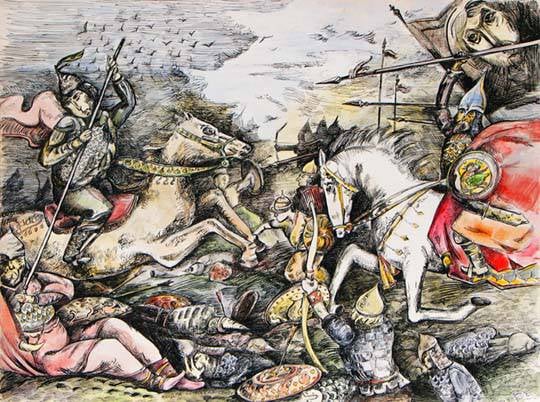
This battle is in its meaning along with such battles as the Kulikovo, Borodino, but it is known to a much smaller circle of people.
To begin with - the song about the invasion of the Crimean Tatars to Russia in 1572, the reader is partially familiar with the film “Ivan Vasilyevich Changes the Profession”, because the pseudo-king did not like it and he forbade her to sing.
(saved in songs recorded for Richard James in 1619 — 1620)
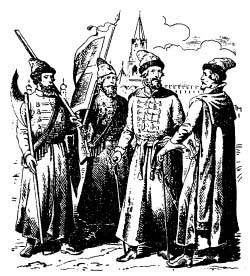 And not a strong cloud has begun to cloud,
And not a strong cloud has begun to cloud,but not strong thunder struck:
where does the dog of the Crimean king go?
And to the powerful kingdom of Moscow:
“Now we’ll go to Stone Moscow,
and we’ll go back, Rezan will take it. "
And how will they be at the Oka River,
and here they will become white tents.
"And think you mind with the whole mind:
who we have to sit in stone Moscow,
and to whom are we in Volodimer,
and to whom do we sit in Suzdal,
and to whom do we keep Rezan Old?
and to whom are we in Zvenigorod,
and who do we have to sit in Novgorod? ”
Devi Murza's son Ulanovich leaves:
“And you are our sovereign, the Crimean king!
And taba, sovereign, we have to sit in stone Moscow,
And to your son in Volodymer,
and to your tribe in Suzdal,
and akin to Zvenigorod,
and to the boyar stable to keep Rezan Old,
and me, sir, perhaps the New City:
I have a light-good-days father there,
Devi-Murza son Ulanovich.
A voice curses from heaven:
“Ino-esi, dog, Crimean king!
Is the kingdom of Tobe inconsistent?
And then there are seventy apostles in Moscow
it is noted of the Three Hierarchs,
there is still an Orthodox Tsar in Moscow! ”
Thou hast run, the dog, the Crimean king,
not by the way, not the way
not by banner, not by black!
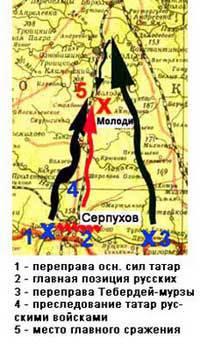 In 1571, the Crimean Khan Devlet-Girey, supported by Turkey and the Polish-Lithuanian state that was already united at that time, organized a devastating raid on Russian lands. Having walked over the regiments of the Russian commanders, standing on the Oka River (called “the belt of the Most Holy Theotokos” by the people), the army of the Crimeans reached Moscow without hindrance, almost completely burned the city (except the Kremlin). Metropolitan Kirill, who was in the Kremlin, almost suffocated from the smoke. As a result of this raid, up to 150 thousands were reportedly led off in captivity.
In 1571, the Crimean Khan Devlet-Girey, supported by Turkey and the Polish-Lithuanian state that was already united at that time, organized a devastating raid on Russian lands. Having walked over the regiments of the Russian commanders, standing on the Oka River (called “the belt of the Most Holy Theotokos” by the people), the army of the Crimeans reached Moscow without hindrance, almost completely burned the city (except the Kremlin). Metropolitan Kirill, who was in the Kremlin, almost suffocated from the smoke. As a result of this raid, up to 150 thousands were reportedly led off in captivity.Ivan the Terrible himself, like most of the Russian troops, was at this time in the north-western borders of the state. There was a Livonian war, and the king was at the head of troops at the forefront. The news that the Crimeans burned Moscow, caught him in Novgorod.
Encouraged by the successful raid on Russia and confident that she would not recover from such a blow for a long time, Devlet-Girey put forward an unprecedented ultimatum: in addition to dismantling the fortifications on Sunzha and Terek, he began to demand from Ivan the Terrible to return the Kazan and Astrakhan khanates. In order to delay a new, even more terrible invasion, the Russians were forced to tear down the fortifications in the Caucasus, and the king sent expensive gifts to the Crimea.
In the summer of the next, 1572, Devlet-Girey, again supported by Turkey (she even provided 40 for the campaign of thousands of people, including 7 of thousands of selected infantrymen-Janissaries) and Poland, moved its regiments to Moscow. He was so confident of victory that he had divided the Russian state between his Murzs beforehand, and he gave permission to the Crimean merchants for duty-free trade on the Volga. Thus, it was no longer tribute or even territorial concessions. For the first time since the time of the Kulikovo battle, the question of the existence of Russia as an independent state has become.
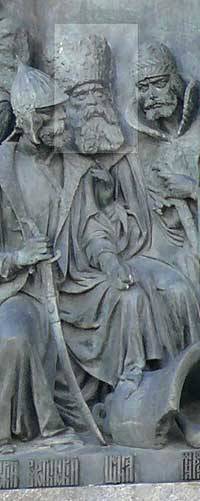 But Moscow was also preparing for the Tatar-Turkish invasion. The “Mandate” was issued to the governor Mikhail Ivanovich Vorotynsky, who at that time was the head of the border guards in Kolomna and Serpukhov. This “Mandate” provided for two types of fighting: the campaigns of the Crimeans to Moscow and their clash with the entire Russian army or the usual raids for the Tatars, robbery and the same rapid withdrawal. In the first case, the compilers considered that Devlet-Girey would lead the troops by the “old road” in the upper reaches of the Oka and ordered the governors to rush to the river Zhizdre (in the modern Kaluga region). If the Crimeans simply came to plunder, then it was ordered to arrange ambushes on the ways of their withdrawal, that is, in essence, to start a guerrilla war. Nevertheless, the Russian army, standing on the Oka under the command of the governor Prince Vorotynsky, numbered about 20 thousand people.
But Moscow was also preparing for the Tatar-Turkish invasion. The “Mandate” was issued to the governor Mikhail Ivanovich Vorotynsky, who at that time was the head of the border guards in Kolomna and Serpukhov. This “Mandate” provided for two types of fighting: the campaigns of the Crimeans to Moscow and their clash with the entire Russian army or the usual raids for the Tatars, robbery and the same rapid withdrawal. In the first case, the compilers considered that Devlet-Girey would lead the troops by the “old road” in the upper reaches of the Oka and ordered the governors to rush to the river Zhizdre (in the modern Kaluga region). If the Crimeans simply came to plunder, then it was ordered to arrange ambushes on the ways of their withdrawal, that is, in essence, to start a guerrilla war. Nevertheless, the Russian army, standing on the Oka under the command of the governor Prince Vorotynsky, numbered about 20 thousand people.On July 27, the Crimean-Turkish army approached the Oka and began to cross it in two places - at the village of Drakino (above Serpukhov downstream) and at the confluence of the river Lopopni, at the Senkin ford. Here a detachment of “boyar children” from 200 kept the defense. They were attacked by the avant-garde of the Crimean-Turkish army under the command of Teberdey-Murza, a hundredfold (!) Superior to the defenders of the crossing. Despite such a monstrous superiority, none of them faltered, even though almost everyone died in a terrible battle. After that, a detachment of Teberdey-Murza reached the Pakhra River (not far from modern Podolsk) and stood up in anticipation of the main forces, cutting off all roads leading to Moscow. He was no longer capable of much bigger, battered in the battle of Senkin's ford.
The main position of the Russian troops, fortified by the walk-city, was located right next to Serpukhov. Gulyay-town was a usual carts, fortified with board shields with slots for shooting and composed of a circle. Against this position, Devlet-Girei set out to distract the two-thousand squad. The main forces of the Crimeans crossed the village of Drakino and clashed in the hardest battle with the regiment of the governor Nikita Odoyevsky. Having defeated the Russian detachment, the main forces of the Crimeans moved to Moscow. Then the voivod Vorotynsky withdrew his troops from coastal positions and moved in pursuit.
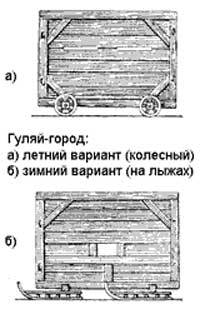 Crimean army stretched out pretty. If its advanced units stood on the Pakhra River, the rear guard only approached the village of Molodi (in 15 kilometers from Pakhra), where it was overtaken by the forward detachment of Russian troops under the leadership of the young and brave commander Dmitry Khvorostinin. A fierce battle broke out, as a result of which the Crimean rearguard was utterly defeated. This is July 29.
Crimean army stretched out pretty. If its advanced units stood on the Pakhra River, the rear guard only approached the village of Molodi (in 15 kilometers from Pakhra), where it was overtaken by the forward detachment of Russian troops under the leadership of the young and brave commander Dmitry Khvorostinin. A fierce battle broke out, as a result of which the Crimean rearguard was utterly defeated. This is July 29.Learning about the defeat of his rearguard, Devlet Giray deployed all his army 180 degrees; Detachment Khvorostinin was face to face with the entire Crimean army. But, having correctly assessed the situation, the young prince was not taken aback, and with an imaginary retreat he lured the enemy to the walking-city, which by that time was already deployed on the banks of the River Rozhai (now Roja), in which there was a large regiment commanded by Vorotynsky himself. A protracted battle began, to which the Tatars were not ready. In one of the unsuccessful attacks on the walk-city, Teberdey-Murza was killed.
After a series of small skirmishes on July 31, Devlet Girey launched a decisive assault on the walk-in city. But he was recaptured. Tatars suffered heavy losses, the adviser to the Crimean Khan Divey Murza was killed. Tatars retreated. The next day, 1 of August, the attacks stopped, but the situation of the besieged was critical - many wounded, almost running out of water. August 2 Devlet Giray again drove his army to the assault, and the attack was repulsed again - the Crimean cavalry could not take a fortified position. And then the Crimean Khan made an unexpected decision - he ordered the cavalry to dismount and attack the walking-city on foot together with the janissaries. Having waited, when the main forces of the Crimeans (including the Janissaries) were drawn into a bloody battle for the walk-city, the voivode Vorotynsky quietly brought a large regiment out of it, conducted it with a hollow and hit the rear of the Crimeans. At the same time, Khvorostinin's warriors made a sortie from behind the walls of the walk-city. Unable to withstand a double strike, the Crimeans and the Turks ran. The losses were enormous: all seven thousand Janissaries, most of the Tatar murzs, as well as the son, grandson and son-in-law of Devlet-Girey, perished. Many higher Crimean dignitaries were captured.
The Russians pursued the remnants of the Crimeans to the crossing over the Oka, where the 5-thousandth rearguard guarding it was completely destroyed.
No more than 10 of thousands of warriors reached the Crimea ...
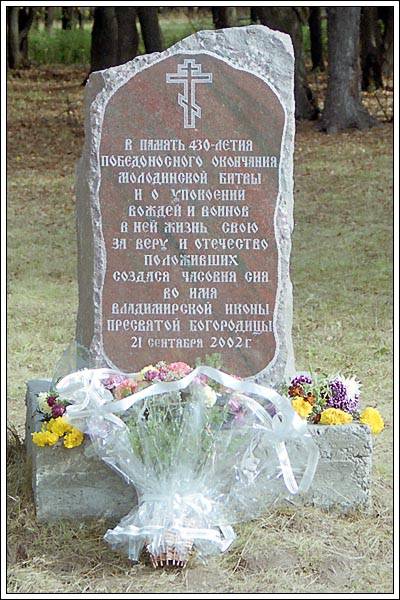
In this inglorious campaign, Crimea lost practically the entire combat-ready male population. Turkey has lost its elite army - Janissaries, still considered invincible. Russia once again showed the world that it is a great power and is able to defend its sovereignty and territorial integrity.
In general, the battle at the village of Molodi became a turning point in relations between Russia and the Crimean Khanate. This was the last major battle of Russia with the Steppe. It put an end to the aggressive expansionist policies of the Crimea and Turkey towards Russia and destroyed Turkey’s plans to return the Middle and Lower Volga regions to its geopolitical interests.
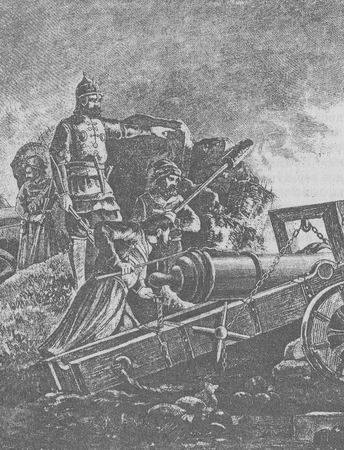
In this great and at the same time unknown battle, the Crimean Khanate was dealt a severe blow, after which it never recovered until its accession to the Russian Empire in the 1783 year.
Information